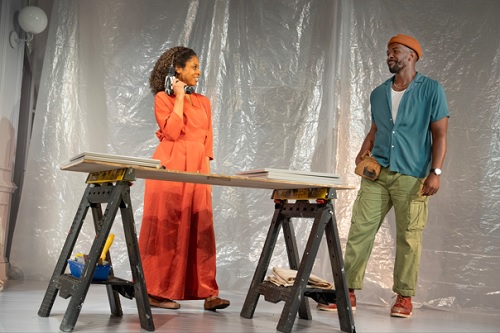NYC News
Review: There’s a Lot to Chew on in Good Bones
October 1, 2024, 10:36.10 pm ET

Photo: Joan Marcus
By Brian Scott Lipton
Just as we watch the slow unveiling of the dream kitchen being built by new homeowners Travis (Mamadou Athie) and Aisha (Susan Kelechi Watson), the many layers of James Ijames’ new play “Good Bones,” now at the Public Theater, become more and more exposed with each scene. And when the stunning set by Maruti Evans (one that even film director Nancy Meyers would envy) is eventually revealed, you may gasp.
Sadly, the play isn’t likely to elicit the same set of oohs and aahs as that glorious kitchen. Unquestionably, one respects the many important issues “Good Bones” wants to make us think about – gentrification, classism, gender differences, generational differences -- and pondering them keeps us engrossed during the two-hour (intermissionless) play.
But unlike “Fat Ham,” for which Ijames rightly won the Pulitzer Prize, “Good Bones” – also directed by Saheem Ali -- often seems simultaneously overstuffed and undercooked, giving audiences both too much to chew on and bones and fat to spit out.
We’re actually unprepared for all the topics “Good Bones” wants to tackle, as the opening scenes focus primarily on whether Travis and Aisha are ready and willing to have a baby. They are the ultimate “opposites attract” couple; he’s a sensitive, almost effeminate rich kid who has become a successful chef, and Aisha, hailing from far more impoverished beginnings in the same city they now live in, has been hired by a sports stadium developer to help clear out her old neighborhood and replace it with a more upscale community.
But not only do their schedules and ambitions seem out of sync from the beginning, Watson and Athie – both fine actors giving excellent performances – have no romantic chemistry, a problem that persists throughout the play. Indeed, it briefly crosses one’s mind that for all her resentment of her husband’s upbringing, Aisha might have married Travis (who she met while he ran a food truck near her graduate school) just for his wealth.
Equally problematic, Watson has a surplus of chemistry with the handsome Khris Davis, handing in another first-rate performance as the couple’s contractor Earl, a man who takes so much pride in his work that he has handmade his own cabinet handles. In a scene that may be meant to feel only slightly flirtatious as the twosome have their first real conversation, I half-expected them to engage in sex – even though Aisha has seemingly just learned she’s pregnant.
It would almost make sense for them to pair up, as they grew up in the same poor neighborhood (although their childhoods don’t seem to have overlapped), giving them shared points of reference and an easy rapport, at least at first. But once Earl fully understands Aisha’s job – as well as her still-lingering hatred of the old neighborhood -- they become almost mortal enemies.
While Aisha insists she’s “not throwing the baby out with the bathwater,” Earl is adamant that some value remains in the old ‘hood (where he still lives.) Further, he’s openly resentful of people who ignore their heritage and aspire to being “bougie,” a term he flings both at Aisha and his gender-fluid younger sister Carmen (a charming Tea Guarino), now a finance major at the University of Pennsylvania. One can acknowledge he may have some valid points.
However, it’s clear, even if it’s never stated, there’s at least one flaw in Earl’s viewpoint: as Aisha talks about being bullied and harassed during her childhood, he never seems to take into account that he may have been far less vulnerable due to his gender and size.
But it’s equally clear that Aisha’s motives for both taking her job – and carrying out her mission – are more personal than political. Ultimately, we realize Aisha is trying to get rid of her ghosts, even though they (or some other spirits) have followed to her grand new house, once the showplace of her neighborhood (and, coincidentally, a refuge for Earl and Carmen after it became dilapidated.) Strange noises, suddenly appearing things, and unknown footsteps plague Aisha, until she’s finally willing to make a move to unite the past and the present – something neither Earl nor Travis seem fully capable of doing.
Who knows what really happens next. Still, for all its flaws, I can’t wait to see what Ijames serves us in the future.
LATEST NYC NEWS

The Lobster Cone Takes New York City by Storm
December 21, 2024, 9:33 am ET
If you haven’t been to Bryant Park for Red Hook Lobster Pound’s new “Lobster Cone,” you may want to make a trip before the Winter Village closes up shop after the holidays. ... READ MORE

Frrrozen Decadence: Last Crumb x Serendipity3 Unveil the Ultimate Holiday Cookie
December 20, 2024, 5:54 pm ET
Last Crumb, the viral Hollywood cookie sensation, has teamed up with iconic NYC eatery Serendipity3 to debut the Frrrozen Hot Chocolate Cookie. Inspired by Serendipity3’s legendary dessert, th... READ MORE

Angelina Bakery Brings Holiday Cheer with Toys for Tots Drive at Times Square
December 20, 2024, 5:54 pm ET
Angelina Bakery, renowned for its Italian-inspired treats, is celebrating the soft opening of its 7 Times Square location with a heartwarming Toys for Tots drive this Sunday and Monday. Partnering ... READ MORE


 Sign up for our newsletter !
Sign up for our newsletter !